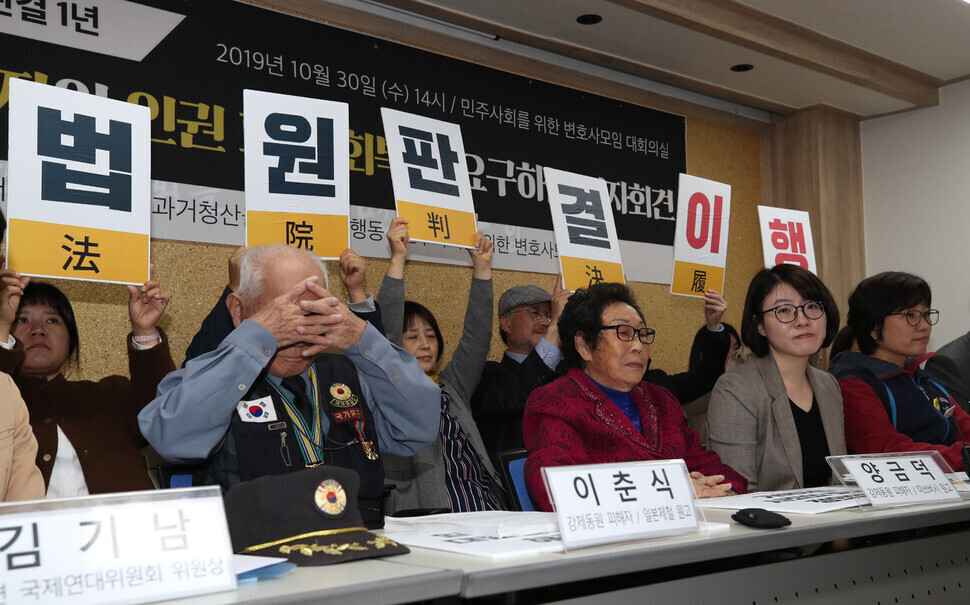hankyoreh
Links to other country sites 다른 나라 사이트 링크
S. Korea to begin liquidating Nippon Steel assets on Aug. 4

The liquidation of the assets of Japanese companies that have failed to comply with a South Korean court order to compensate victims of forced labor during Japan’s colonial occupation is slated to begin on Aug. 4, prompting the Japanese government to clearly threaten retaliatory measures. If the Japanese government carries through on that threat, it’s likely to reinforce a vicious cycle of economic retribution for historical disputes.
“The Japanese government plans to take countervailing measures if the assets of Nippon Steel are liquidated. Various measures are being discussed,” the Yomiuri Shimbun, a Japanese newspaper, reported on Aug. 2.
That echoed remarks made by Japanese Chief Cabinet Secretary Yoshihide Suga during an appearance on Yomiuri TV on Aug. 1. “We are reviewing all responses [to liquidation]. Our course is clear,” Suga said. The retaliatory measures that are being discussed in Japan include raising tariffs, suspending remittances, restricting visa issuance, seizing South Korean assets in Japan, and temporarily recalling the Japanese ambassador to South Korea.
But since the actual liquidation of Nippon Steel’s assets in South Korea is expected to take a considerable amount of time – including the review of the sale order, the valuation of the stock, and the sale itself – it’s unclear when the Japanese government would actually take retaliatory measures.
Furthermore, Japan is also moving cautiously, with the awareness that its retaliatory measures could also have domestic repercussions, just as when it imposed export controls on South Korea last year. Such concerns were expressed in a Sunday article by the Nikkei, another Japanese newspaper: “Measures such as restricting visa issuance or imposing financial sanctions could harm Japanese companies and citizens.”
Such considerations make it likely that the Japanese government will keep an eye on the liquidation process rather than immediately resorting to retaliation. “The deadlock will continue until the end of the year,” the Yomiuri Shimbun reported, quoting an official in the Japanese government.
Kyodo News cited multiple government officials as saying that Tokyo’s “intimations about retaliation are aimed at giving the South Koreans more of an incentive to block liquidation.”
Both South Korea and Japan regard a head-on confrontation as dangerous, but the trouble is the lack of a viable solution. The Japanese government refuses to budge from its stance that the forced issue labor was completely resolved by the two countries’ 1965 claims agreement. The South Korean government has reiterated its commitment to finding a “victim-centered” solution to the issue out of respect for the Supreme Court’s judgment, but it hasn’t managed to devise a concrete solution.
“We are open to an ongoing discussion about reasonable ways to resolve this issue while respecting the judicial decision and realizing the rights of the actual victims, along with taking into account our two countries’ bilateral relations,” South Korea’s Ministry of Foreign Affairs said.
By Kim So-youn, staff reporter
Please direct comments or questions to [english@hani.co.kr]
Editorial・opinion
![[Editorial] Yoon must halt procurement of SM-3 interceptor missiles [Editorial] Yoon must halt procurement of SM-3 interceptor missiles](https://flexible.img.hani.co.kr/flexible/normal/500/300/imgdb/child/2024/0501/17145495551605_1717145495195344.jpg) [Editorial] Yoon must halt procurement of SM-3 interceptor missiles
[Editorial] Yoon must halt procurement of SM-3 interceptor missiles![[Guest essay] Maybe Korea’s rapid population decline is an opportunity, not a crisis [Guest essay] Maybe Korea’s rapid population decline is an opportunity, not a crisis](https://flexible.img.hani.co.kr/flexible/normal/500/300/imgdb/original/2024/0430/9417144634983596.jpg) [Guest essay] Maybe Korea’s rapid population decline is an opportunity, not a crisis
[Guest essay] Maybe Korea’s rapid population decline is an opportunity, not a crisis- [Column] Can Yoon steer diplomacy with Russia, China back on track?
- [Column] Season 2 of special prosecutor probe may be coming to Korea soon
- [Column] Park Geun-hye déjà vu in Yoon Suk-yeol
- [Editorial] New weight of N. Korea’s nuclear threats makes dialogue all the more urgent
- [Guest essay] The real reason Korea’s new right wants to dub Rhee a founding father
- [Column] ‘Choson’: Is it time we start referring to N. Korea in its own terms?
- [Editorial] Japan’s rewriting of history with Korea has gone too far
- [Column] The president’s questionable capacity for dialogue
Most viewed articles
- 1Months and months of overdue wages are pushing migrant workers in Korea into debt
- 2Trump asks why US would defend Korea, hints at hiking Seoul’s defense cost burden
- 3[Editorial] Yoon must halt procurement of SM-3 interceptor missiles
- 4At heart of West’s handwringing over Chinese ‘overcapacity,’ a battle to lead key future industries
- 5[Guest essay] Maybe Korea’s rapid population decline is an opportunity, not a crisis
- 6Fruitless Yoon-Lee summit inflames partisan tensions in Korea
- 7First meeting between Yoon, Lee in 2 years ends without compromise or agreement
- 8Dermatology, plastic surgery drove record medical tourism to Korea in 2023
- 9Under conservative chief, Korea’s TRC brands teenage wartime massacre victims as traitors
- 10Anti-immigration candidate marauds across Korea with squad detaining foreigners